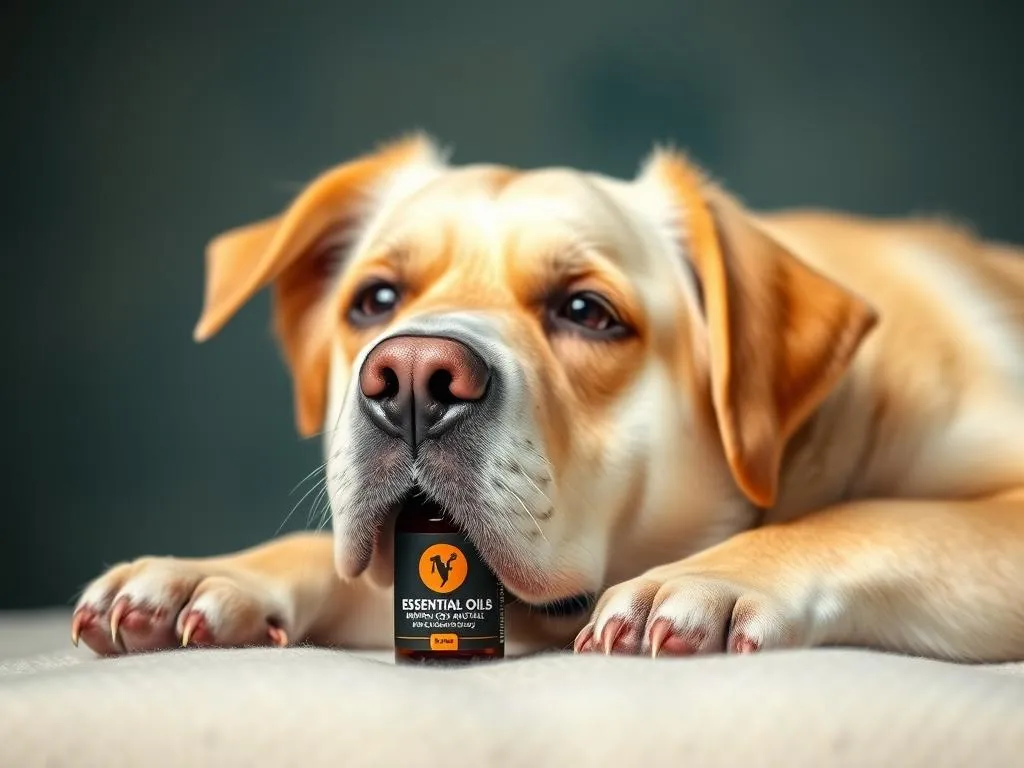
Introduction
Maintaining a dog’s health is a top priority for any responsible pet owner. Just like humans, dogs can experience a range of health issues throughout their lives, from minor ailments to more serious conditions. This is why it’s essential to have a well-rounded approach to canine health care, which includes regular veterinary visits, a balanced diet, and exercise. However, many pet owners are increasingly turning to natural remedies to complement traditional veterinary care.
One of the most popular natural solutions involves essential oils. These oils, extracted from plants, have been praised for their therapeutic properties and potential benefits in promoting overall health. In this article, we will explore the best essential oils for dogs, their uses, and important safety considerations for pet owners.
Understanding Essential Oils
What Are Essential Oils?
Essential oils are concentrated extracts obtained from various parts of plants, including flowers, leaves, stems, and roots. The extraction process typically involves methods like steam distillation or cold pressing, which helps preserve the plant’s natural properties. These oils are packed with aromatic compounds that can have therapeutic effects when used appropriately.
Essential oils work by interacting with the limbic system in the brain, which can influence emotions, behaviors, and physiological responses. This makes them especially valuable in promoting relaxation, reducing anxiety, and even alleviating physical ailments in dogs.
Benefits of Essential Oils for Dogs
Essential oils can serve as natural remedies for various common ailments in dogs. Here are a few key benefits:
- Natural Remedies for Common Ailments: Certain oils can help alleviate symptoms of conditions like arthritis or allergies.
- Stress Relief and Anxiety Reduction: Many oils, such as lavender, are known for their calming effects, which can be beneficial during stressful situations, like thunderstorms or vet visits.
- Skin Care and Pest Control: Essential oils can also assist in managing skin irritations and repelling pests like fleas and ticks.
Safety Considerations
Potential Risks of Essential Oils for Dogs
While essential oils for dogs can be beneficial, it’s crucial to be aware of potential risks. Some oils can be toxic to dogs, leading to serious health issues. Here are a few oils to avoid:
- Tea Tree Oil (in high concentrations)
- Oil of Wintergreen
- Pennyroyal Oil
- Cinnamon Oil
Symptoms of essential oil poisoning in dogs can include vomiting, diarrhea, lethargy, tremors, and difficulty breathing. If you notice any of these signs after using essential oils, contact your veterinarian immediately.
How to Safely Use Essential Oils
To ensure the safe use of essential oils for dogs, follow these guidelines:
- Dilution Guidelines: Essential oils should always be diluted before use. A common ratio is one drop of essential oil per teaspoon of carrier oil (like coconut or olive oil).
- Recommended Application Methods: Oils can be used in various ways, such as diffusion, topical application, or ingestion (under guidance).
- Consult a Veterinarian: Always talk to your vet before introducing essential oils into your dog’s care routine. They can provide personalized recommendations based on your dog’s health and needs.
Best Essential Oils for Dogs
Calming and Anxiety Relief
Lavender Oil
Lavender oil is one of the most popular essential oils for dogs, known for its calming properties. It can help reduce anxiety during stressful situations, such as fireworks or car rides.
- Application Methods: You can diffuse lavender oil in your home or apply a diluted version to your dog’s collar.
Chamomile Oil
Chamomile oil is another excellent option for soothing anxious dogs. It has anti-inflammatory and calming properties that can help ease tension and promote relaxation.
- Recommended Usage: Use chamomile oil in a diffuser or dilute and apply it to your dog’s bedding to create a calming environment.
Skin and Coat Care
Tea Tree Oil
Tea tree oil possesses antifungal and antibacterial properties, making it beneficial for treating skin irritations and infections. However, it must be used with caution.
- Precautions for Use: Always dilute tea tree oil significantly and monitor your dog for any adverse reactions.
Coconut Oil
While not an essential oil in the strictest sense, coconut oil provides excellent benefits for skin and coat health. It moisturizes dry skin and can help alleviate itching.
- Usage Tips: You can apply a small amount of coconut oil directly to your dog’s skin or mix it into their food for internal benefits.
Pest Control
Peppermint Oil
Peppermint oil is effective in repelling fleas and ticks, making it a natural pest control solution for dogs.
- Safe Application Strategies: Dilute peppermint oil in a carrier oil and apply it to your dog’s collar or bedding.
Cedarwood Oil
Cedarwood oil is another essential oil known for its pest-repelling properties. It can help keep fleas, ticks, and other unwanted critters at bay.
- How to Use Safely: Similar to peppermint oil, cedarwood oil should be diluted before application.
Digestive Health
Ginger Oil
Ginger oil is renowned for its ability to alleviate nausea and promote digestion. It can be particularly helpful for dogs who experience motion sickness.
- Recommended Dosages and Methods: Use ginger oil sparingly, diluting it before applying it to your dog’s skin or mixing it with their food.
Fennel Oil
Fennel oil helps promote digestive health and can relieve bloating and discomfort.
- Application Advice: Fennel oil should also be diluted and can be mixed into food or applied topically.
Application Techniques
Diffusion
Using a diffuser can be an effective way to introduce essential oils for dogs into your home.
- How to Use a Diffuser Safely: Ensure the diffuser is placed in an area where your dog can leave if they find the scent overwhelming.
- Recommended Duration and Frequency: Diffuse for short periods (15-30 minutes) to start, gradually increasing as your dog becomes accustomed to the aroma.
Topical Application
When applying essential oils topically, it’s vital to follow best practices.
- Best Practices for Applying Diluted Oils on the Skin: Always apply diluted oils on less sensitive areas, like the back of the neck or between the shoulder blades.
- Areas of the Body to Avoid: Steer clear of sensitive areas, such as the eyes, ears, and nose.
Ingestion
Ingesting essential oils can be beneficial but must be done cautiously.
- Guidelines for Safe Ingestion of Essential Oils: Only certain oils are safe for ingestion. Always consult your vet before giving your dog any essential oils orally.
- Recommended Oils and Dosage: Oils like ginger and fennel are generally considered safe in small, diluted amounts.
Monitoring Your Dog’s Response
Signs of Positive Response
When using essential oils for dogs, it’s essential to monitor their response.
- Indicators that the Essential Oil is Beneficial: Look for signs of relaxation, reduced anxiety, or improved skin condition.
- How to Observe Behavioral Changes: Pay attention to changes in your dog’s appetite, energy levels, and overall demeanor.
Signs of Adverse Reaction
Unfortunately, some dogs may react negatively to essential oils.
- Symptoms to Watch For: Signs of adverse reactions can include excessive drooling, vomiting, lethargy, or a rash.
- When to Seek Veterinary Advice: If you notice any concerning symptoms, contact your veterinarian immediately for guidance.
Conclusion
In conclusion, essential oils can be a valuable addition to your dog health care toolkit when used safely and responsibly. From promoting relaxation to aiding in skin health and pest control, the benefits are numerous. However, it’s essential to remain informed about the potential risks and to consult with a veterinarian before introducing any new treatments. By making informed decisions, you can enhance your dog’s health and well-being using natural remedies.
FAQs
Common Questions about Essential Oils for Dogs
-
Are all essential oils safe for dogs?
No, some essential oils are toxic to dogs. Always research and consult your vet before use. -
How can I tell if my dog is having a reaction to an essential oil?
Look for signs like vomiting, lethargy, or skin irritations. If you notice any concerning symptoms, seek veterinary advice. -
Can I use essential oils on puppies?
Puppies are more sensitive, so it’s best to consult your veterinarian before using essential oils on them. -
How do I choose the right essential oil for my dog’s needs?
Consider your dog’s specific health concerns and consult with a veterinarian for tailored advice. -
Is it safe to use essential oils in a home with multiple pets?
Yes, but you should monitor all pets for any adverse reactions and ensure the oils are used safely around them.
By understanding the best essential oils for dogs and how to use them effectively, you can enhance your furry friend’s health and happiness naturally.









